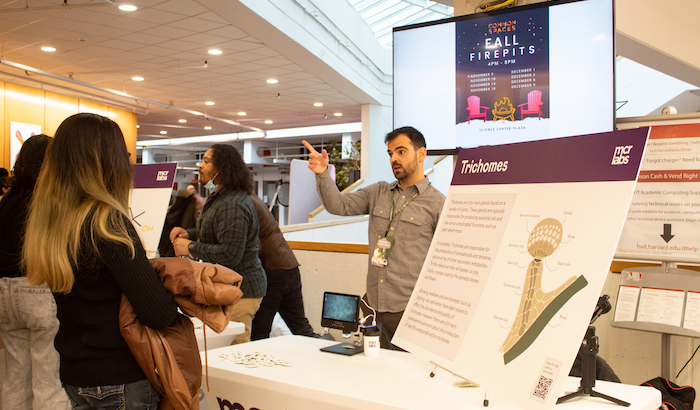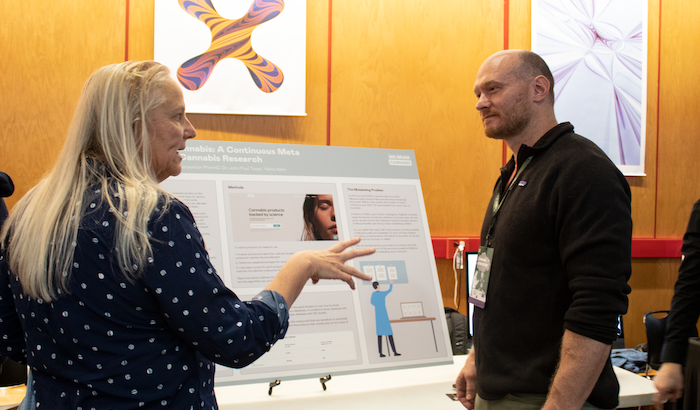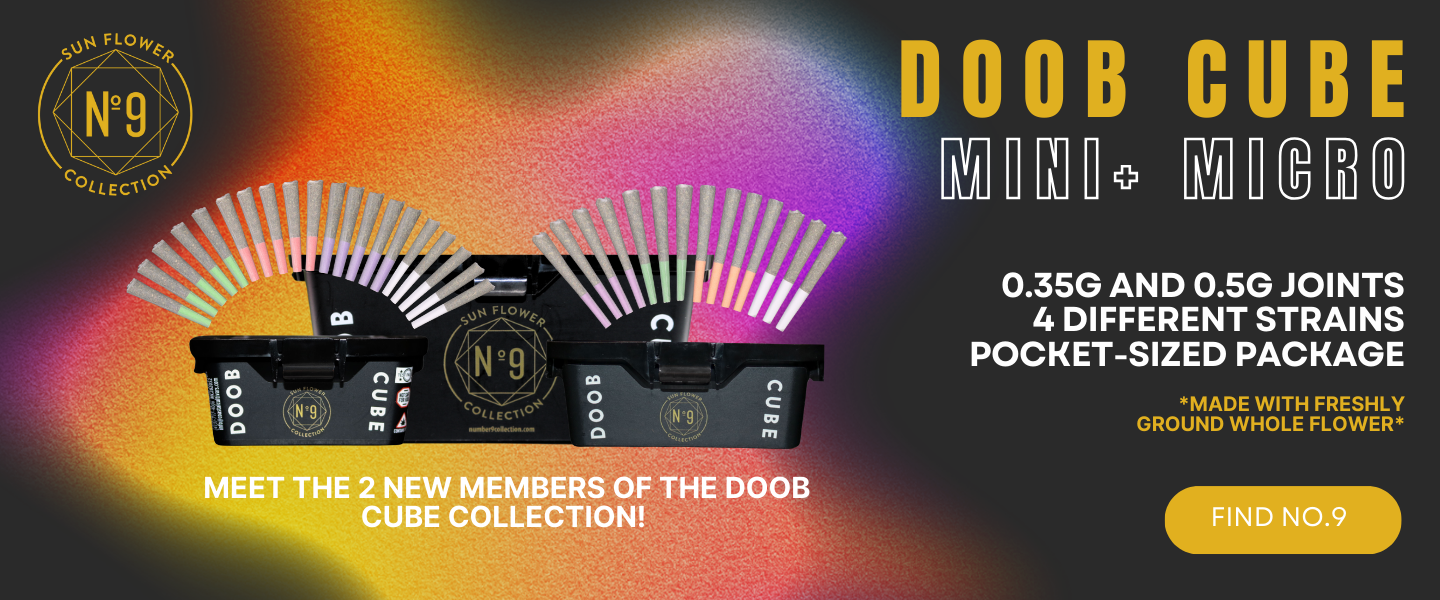
“We want this event to bridge the gap between academic researchers, industry innovators, legislators, and your average consumer.”
You may be similar to us in that you exhausted your willingness to have dummies explain science to you during the pandemic.
The problem in this case, though, is that we’re kind of stupid too when it comes to explaining serious scientific topics. While we learn more about this plant and all its data-supported potential with every article we publish, there are still some things that are best left to experts—like describing research on residual solvents and lab contamination, not to mention preaching on the preservation of terpene and cannabinoid potency.
And so to preview this year’s Cannabis Science Fair, where those topics will all be front and center at the Harvard Science Center in Cambridge this coming Saturday, Dec. 9, we threw questions to Event and Outreach Manager Melissa Kenton and Marketing Manager Alexandra Gomes of the hosting MCR Labs in order to propel readers toward a deeper understanding. Our questions are in bold below followed by their wicket smart responses.
First, let’s go back to the first time you did this in 2021. That’s not too long ago, but with a lot of technology advancing at an exponential rate, how much of the tech and methods that were brand spanking new back then are more or less outdated today?
What’s so exciting about the field of cannabis science is that there is so much we still don’t know about the plant. Any new discovery or invention is going to have so much room for growth. With that in mind, I wouldn’t say that any of those initial projects are necessarily outdated, but many have been built upon since that first fair.
What was the initial vision for the science fair, and how was that tweaked due to the kinds of applications, pitches, and participants you have had through the years? And what will the format look like for this coming one?
We first came up with the science fair when we were brainstorming how we could bring the community together and what we had to offer in terms of educational experiences. We wanted this event to bridge the gap between academic researchers, industry innovators, legislators, and your average consumer. Each one of those groups have their own unique perspectives, lived experiences, and knowledge to share. However, it has been challenging to reach academics and convince them that this nontraditional event is worth it. The stigma surrounding cannabis is still alive and well, but we’re seeing more interest from that crowd every year.
The format for the science fair is one of the most unique aspects of the event, with the main focus being the poster projects displayed throughout the central arcade. We find this format gives both presenters and attendees the opportunity to connect one on one throughout the whole day to discuss any aspect of their work. We’ve found attendees enjoy this exhibition part of the fair the most in previous years. We also have three presentations taking place throughout the event.
From a layman’s look at the science-related topics that have been much discussed around the industry over the past year, it seems that potency testing has taken up a disproportionate amount of attention. I know [MCR VP of Marketing and Technology] Yasha [Kahn] will be addressing this in his big presentation; is there a sense that this is the issue a lot of people are coming to hear about? And what are they in for?
We believe the biggest interest in the fair is the open exhibition floor, during which attendees can connect directly with researchers, scientists, and innovators. With that said, lab fraud is a major problem for the cannabis industry nationwide. If consumers can’t rely on the legal market to provide accurately labeled, contaminant-free cannabis products then what is the point of testing and labeling? Yasha will be speaking to this problem on a national level, comparing data from multiple states illustrating what potency data manipulation looks like, and how to catch it. He’ll also address mold data manipulation, which is a much bigger risk to consumer health than potency inflation.

There is science that happens in labs, testing and other kinds, as well as the science that happens in actual growing, processing, extracting, etc. which is often related though happening in a different kind of setting. I see CNA Stores has a project on ice water extraction, for example. Who is the prime demographic for this conference, and how did you try to balance the projects so they cover all this ground, from the grow to the lab?
Our target audience here is the larger cannabis community, as the goal is to bring together all those different sectors. We want academics researching the endocannabinoid system to connect with growers and producers trying to create unique products. That kind of crossover is where the magic happens in collaborations. Both of those groups can learn from each other. This year we really prioritized getting the word out about project submissions earlier, with a focus on attracting more industry innovators. Those kinds of projects we find are the most valuable to the cannabis market. But there is definitely a balancing act of ensuring there is something for everyone. We’ve found that most folks in cannabis are curious by nature, so even if a project is not applicable to their specific interest it’s still fun and interesting to learn about.
Given MCR is hosting, tell us a little bit about Michael Esposito’s work he is presenting and anything else you are bringing to the table.
Mike Esposito, our lead microbiologist, is going to highlight how molecular tools can help identify fungal diseases in cannabis. His project stems from our speciation test, which is one of our plant health screens. With mold being one of the biggest issues to growers in New England, this project shows how valuable it can be to differentiate between certain species to tackle problems in the grow quickly and effectively. MCR will also have Soren Eustis, our lab director at our Maine Facility, and Yasha Kahn, our VP of Marketing and Data Science presenting their work as well.
Of all the participants, are there any who MCR proactively reached out to because the research was something you felt stakeholders in Mass just absolutely had to learn about?
When we were deciding on speakers for this year, we knew we absolutely wanted to get Julie Johnson from the Cannabis Control Commission involved. Julie will be presenting on the research they’ve conducted on medical programs across the US, analyzing the sustainability of such programs as the adult-use programs flourish. Their agency has a whole department dedicated to cannabis research and they’re doing a lot of important work. This is an opportunity for the agency to share that work with the community, while also learning about new technology and research happening in the market they govern.
With the creation of a coming state cannabis research center, there has been talk about how Mass has perhaps missed out on an opportunity to become a cannabis research hub but could become that in the future. So first, any thoughts on that project and on how scientists like the ones we will see at the Cannabis Science Fair could benefit from such a state apparatus?
The news about the research center is really exciting. We’re hopeful that scientists and researchers outside of the center will be given more direct opportunities to collaborate with the commission’s research department. One of the top hurdles to research is acquiring resources. Grants or other programs funded through the center made available to the community would be a game changer for cannabis scientists in this state.
As for where Mass is when it comes to cannabis research, there does seem to be a bit going on despite all the hurdles. Where would you say the commonwealth stands among other states when it comes to this realm? And what do you see as the future of cannabis research around here?
Massachusetts is a leader in biomedical research and academia. There are a lot of resources available and a lot of very smart people in this state. That is a great foundation to build a cannabis research hub on, if the right policies and priorities are enacted and supported. Right now there is a lot of potential and many folks who are doing great work. Dr. Marion Mcnabb, for example, will be presenting on her research into cannabis as a harm reduction tool at this year’s fair. Dr. Staci Gruber is well-known for her research on the neuroscience of cannabis. She also presented at last year’s fair on the neurological impacts of recreational cannabis use versus medical. Dr. Jeff Rawson and his nonprofit the Institute of Cannabis Science has done some great work on cannabis data. With the right resources, we’re confident Massachusetts has a bright future as a leader in cannabis research.
























